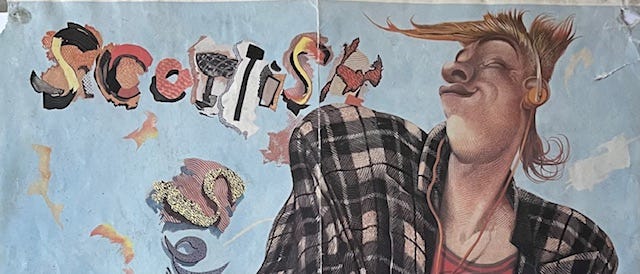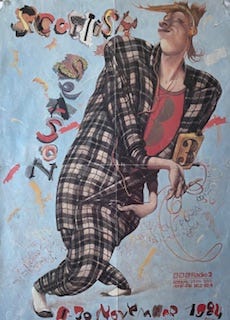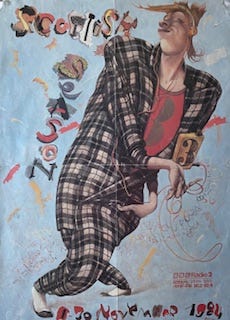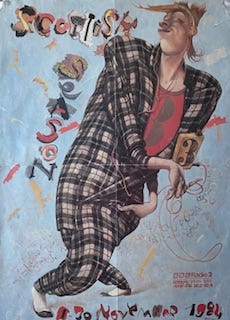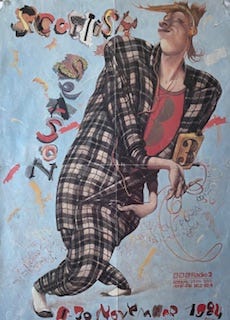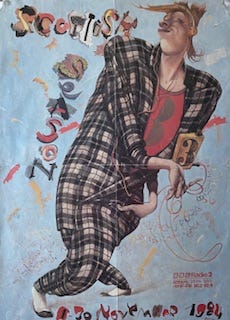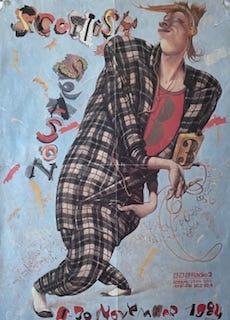My first ever encounter with John Byrne, the Paisley born playwright, painter and all round polymath who died this week aged 83, was a poster for a Scottish Season by BBC Radio 3. This was scheduled to run throughout November 1984, and featured a smorgasbord of drama, art and music.
I had picked up the poster from a pile sitting on a desk in reception of BBC Scotland’s old HQ in Queen Margaret Drive in Glasgow.
I had only just moved to Glasgow, so I’m not sure what I was doing in the BBC, but the picture of this larger than life bequiffed figure in a tartan suit seemed to chime both with Glasgow’s increasingly glossy sense of self-determination, and with its street-smart gallus swagger.
Neither the name nor the art of John Byrne meant anything to me at the time, and it was a good few years before I joined the dots between the Radio 3 poster and what I probably thought were slightly hippy looking sleeves of Gerry Rafferty’s City to City and Night Owl albums that I saw somewhere, not appreciating the visual wonderland of each. I knew nothing of Byrne’s pop up book set design for The Cheviot, The Stag and The Black, Black Oil or The Slab Boys, both crucial markers in Scotland’s late twentieth century cultural history. All I had was this poster.
I first saw one of Byrne’s plays when his first play, Writer’s Cramp, first seen on the Edinburgh Festival Fringe in 1977, was revived in a 1986 Fringe production at the old Little Lyceum Theatre, with Brian Pettifer as Francis Seneca McDade. By that time I’d seen scripts of The Slab Boys in an edition published by Tom Fenton’s Edinburgh based independent publishing house, Salamander Press, and was dazzled as much by Byrne’s cover image as much as his words that roared off the pages inside.
Eventually I saw The Slab Boys and Cuttin’ a Rug, which charted the daily grind of Spanky and Phil, two 1950s working class rockers working in the carpet factory slab room, but with dreams of art school and rock stardom driving them on beyond the drudgery. Like Byrne, Spanky and Phil were products of post World War II aspiration, when rock and roll seemed to open doors and offer possibilities to restless youth.
It was Tutti Frutti on telly, however, that captured the popular imagination on a grand scale. While rooted in realism, the language Byrne put into the mouths of Robbie Coltrane, Emma Thompson and all the rest was a glorious pop derived patois, heightened with deadly precision by Byrne, the eminently stylish back street visionary weaned on rock and roll and American movies.
Byrne was a tweed-clad living artwork with a twinkle in his eye that disguised a steely determination to create a world made in his own image, be it on stage or canvas. Byrne had plenty to say, and for all his wit and wisdom in these ten interviews, they barely scratch the surface of his full expansive discourse on life and art.
The interviews were conducted over a sixteen year period. During that time I appear to have become increasingly fascinated by the way milky coffee hung on Byrne’s elaborately coiffed moustache. All that stuff is best ignored in favour of focussing on the quotes. There was a whole lot more that ended up on the cutting room floor due to space restrictions, and I wish I’d kept it all.
Byrne was a charming interviewee, even if the way he talked into his moustache rather than through it sometimes made transcribing difficult. There was a warmth in his voice and a wisdom in his musings. There was a shyness there too, and a beatific calm. Only conceptual art seemed to rile him. As someone who had come through Glasgow School of Art, his thoughts on the subject were forthright.
I’ve drawn the ten interviews from my own messy archive at coffeetablenotes.blogspot.com rather than the original publications. The List and Scottish Art News stuff should be easy enough to find, but I find the Herald website not always easy to navigate, and I can’t find most of them.
My favourite John Byrne quote comes from our 2006 chat in Aberdeen on a break from rehearsals of the National Theatre of Scotland’s staging of Tutti Frutti, Byrne’s tragicomic TV series that these days would be dubbed a dramady. Tutti Frutti wasn’t a rock and roll musical. Inbetween the patter ricocheting between Big Jazza McGlone, Suzi Kettles and all the rest, there was some darker exploration of the human condition at play. Byrne knew what mattered, mind.
"There's clothes,” he said. “There's music, which is rock 'n'roll. There's love, which is love. And there's life, which is children. Then there's death. Life, death, love, rock 'n' roll. After that, what else is there in life?"
Colquhoun and MacBryde – Dundee Rep, March 17-April 1, 2000
The Herald, March 16, 2000 https://www.blogger.com/blog/post/edit/7717815807671670149/2869006671702910878
''As you get older it becomes less important to impress people in that way. But these people who become superstars, they're not there by accident. They've pushed for that, and they've worked for that, and that's where it so often all goes wrong.''
The Slab Boys – Traverse Theatre, Edinburgh revival , November 18-December 7, 2003
The Herald, November 18, 2003 https://www.blogger.com/blog/posts/7717815807671670149?q=John%20Byrne
''I've got very close friends, a couple of them I grew up with, and we miss each other, and we talk round things, even though we're very close and very fond of each other. Then again, I've got friends of a lesser duration in time, with whom I've an immediate rapport every time I see them. In real life it's quite hard to sustain that with people you've known your whole life. They're doing the same, rehearsing what lines they're going to say, even though we both know we think along the same lines.”
Tutti Frutti stage version – National Theatre of Scotland, His Majesty’s Theatre, Aberdeen, September 21-30 2006, then on tour until 2007
The Herald, September 8, 2006
https://www.blogger.com/blog/post/edit/7717815807671670149/3046710099235790020
"I was 16, and everybody I knew, on hearing Heartbreak Hotel, had their entire perception of the world totally changed. It was extraordinary. It was like something from another planet. It was something you recognised immediately, even though you'd never seen it. You didn't think, that's weird, you'd just go awwww! Everybody did. It came from inside you as well. Nobody told you. You couldn't even see the guy. No-one told you what he looked like or anything. There was just this voice, and because Elvis is such a visual icon, it's difficult to imagine now what that was like.”
"There's clothes. There's music, which is rock 'n'roll. There's love, which is love. And there's life, which is children. Then there's death. Life, death, love, rock 'n' roll. After that, what else is there in life?"
Novia Scotia – Traverse Theatre, Edinburgh, April 29-May 24 2008
The Herald, April 22 2008
https://www.blogger.com/blog/post/edit/7717815807671670149/9002101868996925010
“It’s strange in this country that the avant-garde is the established order. Conceptual art seems to be more about celebrities and invitations to 10 Downing Street and all of that. When I started out, most successful artists were getting bungs off the galleries. It was corruption. Now there’s the whole PR thing as well, so you have a sanitised culture industry that’s manipulated for the lowest common denominator, and all you get is entertainment. But there’ll be a younger generation coming along soon who’ll think all that’s terribly old-fashioned and want to blow it away. I’ve never been the established order. I’ve missed out.”
Uncle Varick, Rapture Theatre, April-June 2014
The Herald, April 29, 2014 https://www.blogger.com/blog/post/edit/7717815807671670149/1909953831338359698
“I don't know how Chekhov does it, how he moves you and makes you laugh. It's a total mystery to me. I saw a production of Uncle Vanya on television many years ago with Laurence Olivier, and it was wonderful, just so human and lovely, but I've also seen some of the dullest versions of Chekhov that make a total arse of it by being too reverential.”
Sitting Ducks – Scottish National Portrait Gallery, Edinburgh, June 14-October 19, 2014
The List, June 2014
https://www.blogger.com/blog/post/edit/7717815807671670149/8483212694415674364
“They put your face on a plate or a tie or something. Which I'm not averse to at all.”
Dead End - Bourne Fine Art, Edinburgh Art Festival, June 4-August 30, 2014 / Sitting Ducks – Scottish National Portrait Gallery, Edinburgh, June 14-October 19, 2014
The List Edinburgh Festivals Guide, July 2014 https://www.blogger.com/blog/post/edit/7717815807671670149/7546204218935499445
“I lived the life of a teddy boy in a complete slum, and it was so exciting, and every new day was a joy, a total and absolute utter joy. So why would I no' do that? Writers do it. Writers use their own life, but very few painters do. I mean, they use a part of it, part of their psyche or whatever it is and try things out, but it's no' that entertaining. Also, I want to entertain myself, and keep myself alive and thinking and constantly surprised. Unless you're totally engaged, it's pointless. It's a fucking hobby. A lot of artists these days have other jobs, but how boring is that? If you're going to paint, you need to do it full time and live it.”
Three Sisters - Tron Theatre, Glasgow, October 1-18 2014
The Herald, September 23, 2014 - https://www.blogger.com/blog/post/edit/7717815807671670149/8194169652673690257
“I chose an old literal translation of Three Sisters by some woman I didnae know at all. It wasnae a version. It was just a straightforward translation into English, so it was very dull, with all the characters talking about themselves and describing their feelings and whatever else right at the start. We cannae sit through that, because we're not Russian.”
The Slab Boys – Citizens Theatre, Glasgow revival directed by David Hayman, February 12-March 7 2015
The Herald, February 15, 2015
https://www.blogger.com/blog/post/edit/7717815807671670149/5618620464292278415
“We'd come to the Citz and seen David onstage, and he was the only Scottish guy, and the only working class guy, I presumed, in the company, and he was the only director I knew. I'd seen him as an actor and thought he was wonderful, and I knew he could do it. I had total confidence in him.”
Paisley’s bid for UK city of Culture 2021, with Alexander Stoddart
Scottish Art News, November 2016 https://www.blogger.com/blog/post/edit/7717815807671670149/6515491470873213038
I was brought up in Ferguslie Park, and I remember thanking God when we moved there, because I knew then that I had all the things I needed for whatever it was that I wanted to do.”
“It was a very stylish place. On a Sunday you'd get people dressed to the nines promenading down the Glasgow Road. There was a great American influence as well. Paisley had its own ice hockey team, the Paisley Pirates. There was one guy, very dapper guy, who had lodgings down our street. It's an extraordinary place, Paisley, very different from Glasgow. Glaswegians were stand-up comics. In Paisley there were oddballs. I preferred the oddballs.
”


